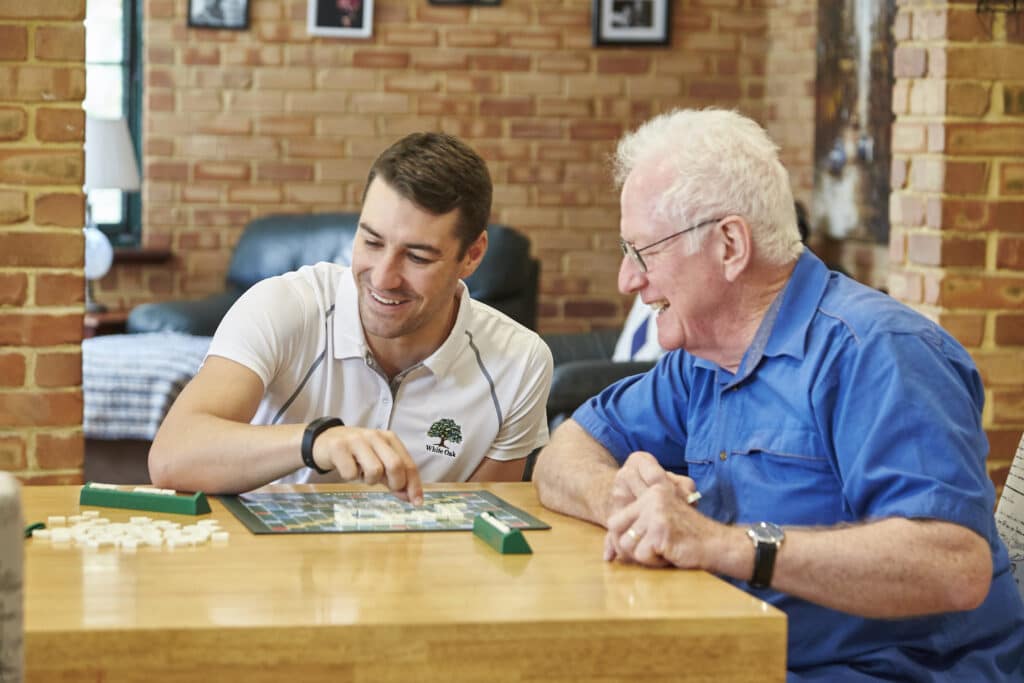White Oak Home Care Services expands its community involvement by managing the Villa Dalmacia Day Centre in Spearwood. Supported by Hall & Prior, it provides culturally appropriate care for clients with Italian, Croatian, and Portuguese heritage, fostering a vibrant hub of culture and community.
How to stay socially active as a senior
Socialising as a senior
To paraphrase Mark Twain, growing old is a privilege that is denied to many. Nonetheless, there are a variety of challenges to adapting to life as a senior. From getting the right amount and type of physical exercise to finding the perfect home care provider for social support, it’s important to maintain a healthy, fulfilling lifestyle.
Being socially active is an integral contributing factor to one’s wellbeing. With its many benefits, it can be just as important and impactful as exercise. In this article, we’ll walk you through the various tips for staying socially active as a senior.
Why is staying socially active important?
Building and maintaining healthy social relationships is important for people of all ages. Humans are social creatures and we both need and desire contact with other people to help us infuse life with richness and meaning.
Recent studies into the impact of social relationships increasingly indicate the many benefits.
- Mental Health
Stress, anxiety, and depression are all reduced among seniors with active social lives. - Physical wellbeing
Maintaining a social network provides greater opportunity for physical activity and getting out and about. - Cognition
The cognitive benefits of a social life are many, as one engages mental as well as emotional functions. - Meaning
The quality of our relationships with others provides our lives with meaning and happiness. - Longevity
There are studies that indicate that the more one socialises in a healthy context the greater their lifespan on average. - Self-esteem
Maintaining an active social life helps individuals of all ages experience greater feelings of self-worth and self-esteem.
Tips for staying socially active as a senior
1. Accept your obstacles
As a senior, life can already present itself with obstacles that may not have been there in the past. From your physical abilities to mobility issues, even cognitive decline and changing interests, it can all make maintaining a social life more difficult.
This is 100% normal. Accepting that there could be obstacles in your way – obstacles that can be overcome – is part of the process. By acknowledging challenges and not pretending they don’t exist or ignoring them, you’re better positioned to face relationships with realistic goals and expectations.
2. Invest in face-to-face time
In the 21st century, it can be hard to find time for face-to-face conversations and arrangements. While many seniors struggle with emerging technologies at the best of times, as part of a social life it can be even more difficult.
Nevertheless, no matter what age you are, spending time with someone is invaluable. As a senior, invest in the time it takes to visit or be visited in person. By sharing time with family or friends, be it a meal or a movie, you’ll find being social less alienating, more enjoyable, and more meaningful. Don’t be afraid to ask your loved ones to visit you more and offer to spend the time doing what you’ll both enjoy.
3. Find the right activities
The key to any endeavour in life is sustainability, and a social life for the elderly is no different. Consider what you enjoy doing but also what you are capable of doing.
There are many different activities you and your family or friends can engage in together. Physical activities can include exercise, dancing, going for a walk, or even cooking. Alternatively, for less rigorous activities, consider reading, movies, listening to music, puzzles, or arts and crafts.
4. Arrange accessible transportation
Access to reliable transportation is an issue faced by most seniors. Even if you are still driving and own your own car, there may be limits on where you’re able to drive to and under what conditions.
If necessary, familiarise yourself with reliable and accessible public transport. Consider a dependable driving service, such as a taxi, or ask your family and friends to help you out. There are a variety of ways of arranging transport, so don’t let your own mobility get in the way of your social life.
5. Get involved in the community
Social lives don’t need to be restricted to just socialising with friends and family. Getting involved in your local community group is an excellent way to establish and maintain meaningful relationships. Whether you regularly attend a religious service, take part in a cards club, or even volunteer for a not-for-profit or charity, there are so many opportunities to meet other people, create new friendships, and dial up your social activity – not to mention positively contribute to your community.
6. Consider a retirement village
This tip may not be always suitable for all individuals, but retirement villages and communities offer reasonably priced accommodation and full calendars of social activity. By living alongside other residents, you may find being socially active a lot easier, less exhausting, and requiring less exertion.
7. Embrace technology
Technology is amazing. We’re not just talking about the ability to video call loved ones a thousand miles away or send letters at the touch of a computer button. There is an entire industry of technology developed specifically to assist seniors in every aspect of their life. General communication, transport, organisation, and more can all be made easier with assistance technology, and your social life is no different.
8. Access social support services
Finally, accessing social support services is a great way to stay socially active. Home care providers, such as White Oak, provide general assistance in helping you arrange and get to your social engagements. Your provider can help drive you to a friend’s house, teach you how to use technology, or just play a game or cook together. However, you use your social support services, make sure it works for you and contributes positively to the quality of your life.
Need social support? Contact White Oak today
If you’d like to find out about our social support services in more detail or would like to discuss how our care providers can help you to stay socially active for many years to come, make sure to check out our social support page. Alternatively, contact us directly for a friendly chat today.



